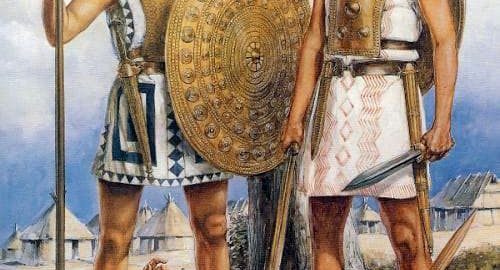Lucius Siccius Dentatus was probably a historical figure, although his history was written for the first time only in the middle of the first century BCE (several centuries after his death) by a Roman scholar and writer Marcus Terentius Varro.
Earlier sources of information that were used to reconstruct the details of his life and supplement the original oral accounts of his deeds were folk tales and legends as well as historical events from the 2nd and 1st century BCE. The Romans believed that Dentatus was a plebeian hero who supported the people in the fight against the oligarchs who contributed to his murder around 450 BCE.
From the accounts of Dionysius of Halicarnassus it is known that Dentatus served in the army as a mere legionary at the age of twenty-seven. In the battle with the Wolskis, his legion was defeated and the battle marks were intercepted by enemies, but Dentatus managed to recover them alone, which, according to Dionysius, “spared centurions of eternal shame”. His heroism was recognized and he was decorated with a gold wreath (corona aurea).
During the next battle, the legionary again showed great heroism. He rescued the highest-ranking centurion (primus pilus) of legion II in which he himself served. Primus pilus during the battle was overthrown to the ground by enemies, who then took him the Eagle – the holiest of all legionary characters. Dentatus rescued his commander and retrieved the Eagle he had previously taken. The centurion was very confused by the situation and wanted to hand over command to his legionary in exchange for this heroic act. Dentatus, in humbleness and respect to his commander, refused to replace him, but the consul promoted him, giving him the rank of primus pilus in the 1st legion.
Lucius Siccius Dentatus during forty years of military service took part in one hundred and twenty battles, won eight or nine duels in which, interestingly, the enemy always challenged him, and looted from thirty-four or thirty-six warriors. He had forty-five scars – all at the front, none at the back, which shows that he was never afraid of fighting and bravely stood shoulder to shoulder with each opponent. It is worth mentioning that twelve of his scars were a reminder of one fight only. All the awards and decorations given to Dentatus for his military merits make a great impression.
In his life he received eighteen ceremonial spears (hasta pura), twenty-five decorative medallions (phalerae), eighty-three torcoves, one hundred and sixty bracelets (armillae), fourteen citizens’ wreaths (corona civica) from oak leaves, awarded for saving the life of a Roman citizen in battle, eight gold wreaths (corona aurea) in the shape of a leaf wreath oak, given for killing the enemy in a duel, three wall wreaths (corona muralis) made of gold in the shape of walls, given to the first who crossed the wall during the siege of the enemy city, and one siege wreath (corona obsidionalis), consisting of grass and flowers growing on the battlefield, awarded for freeing an army besieged or surrounded on the battlefield. In addition, he received a basket full of coins, ten prisoners who were his personal slaves and twenty oxen.
The Roman writer Valerius Maximus even states that the number of Dentatus military decorations would be enough to distribute the entire one legion. Aulus Gellius, writer from the 2nd century CE he noted an amazing curiosity that because of the bravery of Dentatus, he was called Roman Achilles. It should also be mentioned that the nickname (cognomen) “Dentatus” means “having a tooth” in the sense of the fangs of a wild animal. Perhaps he owes this nickname because of his bravery and uncompromising attitude in battle. However, due to the fact that Roman nicknames were often degrading, it is possible that he received it simply because of his own broken or protruding tooth.
Lucius Siccius Dentatus during his life also played the role of the opponent of the decemvir, which eventually led to his death. The Decemvirs formed a clerical college formed from an agreement between patricians and plebeians in 452 BCE in order to need to codify the law. The college consisted of 10 members and in 451-449 BCE held the highest authority in the state. However, the Decemvirs were overthrown after their power turned into tyranny.
In 450 BCE Dentatus received the title of military tribune but due to the fact that he was in opposition to the decemvirs, he was trapped by his opponents. Again in his life and for the last time he showed great bravery and bravery, for before he was killed he managed to send many enemies to the other world. His body was found among the ring of killed rivals. The death of Dentatus became the beginning of the end of the decemvir. News of Dentatus’ murder caused soldiers to rebel and soon overthrew the decemvirian tyranny.






